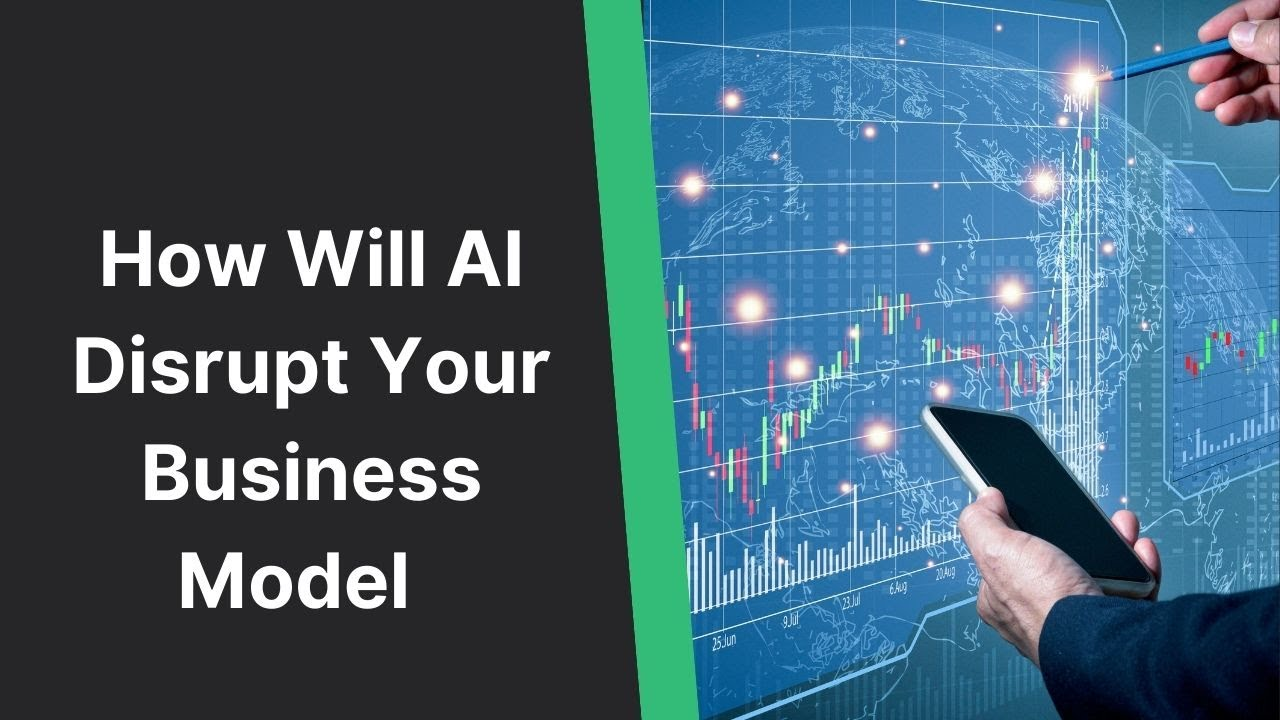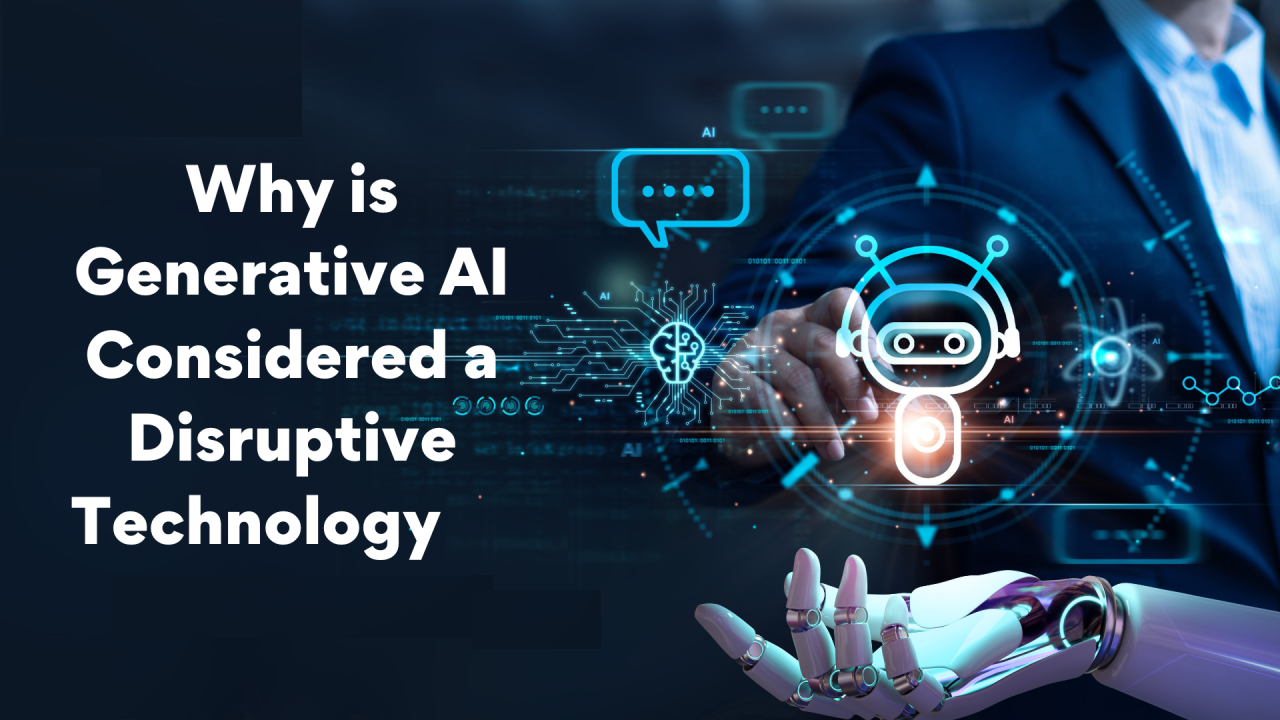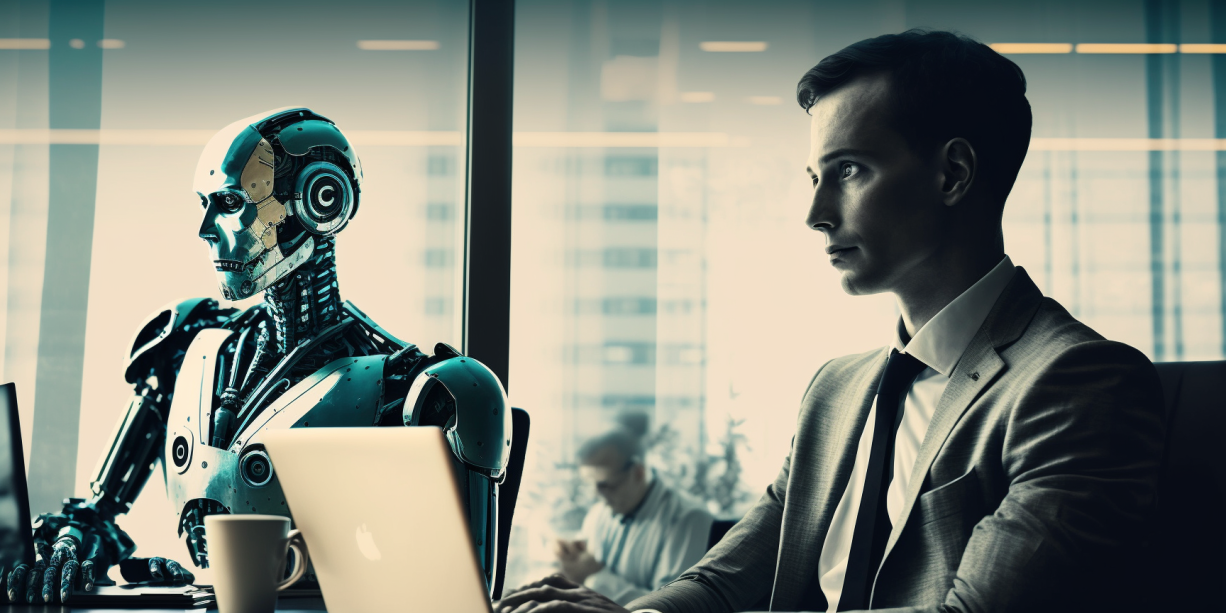
Artificial intelligence (AI) is undoubtedly one of the most transformative technologies of our time, profoundly impacting industries worldwide. Its ability to automate tasks, analyze vast amounts of data, and uncover hidden patterns is revolutionizing how businesses operate and interact with their customers, which arises the question, How AI Is Disrupting Your Industry?As AI continues to evolve, its impact will only grow, making it an indispensable tool for companies seeking to thrive in the competitive landscape of today and tomorrow.
As AI continues to infiltrate various industries, it is fundamentally altering the way companies approach problem-solving, decision-making, and innovation. AI-powered tools and algorithms are enabling businesses to automate repetitive tasks, optimize resource allocation, and personalize customer experiences to an unprecedented degree.
Why AI Is A Disruptive Force?
Artificial intelligence (AI) is a disruptive forcebecause it has the potential to fundamentally change the way we live and work. AI is already being used in a variety of industries, from healthcare to finance to transportation, and it is only going to become more widespread in the years to come.
Here are some of the reasons why AI is so disruptive:
- AI can automate tasks that were previously thought to be the exclusive domain of humans - This includes tasks such as customer service, data entry, and even some forms of surgery.
- AI can analyze large amounts of data to identify patterns and trends that would be impossible for humans to see -This can be used to make better decisions about everything from marketing campaigns to financial investments.
- AI can learn and adapt over time, which means that it can become increasingly sophisticated and effective at performing tasks -This makes AI a valuable tool for businesses that are looking to stay ahead of the competition.
The impact of AI is only going to grow in the years to come. As AI becomes more sophisticated and affordable, it will be used in even more ways to disrupt industries and change the way we live and work.
Potential Benefits
Here are some of the potential benefits of AI:
- Increased productivity and efficiency
- Improved decision-making
- New products and services
- Greater personalization
- Reduced costs
Potential Risks
However, there are also some potential risks associated with AI:
- Job displacement
- Privacy concerns
- Algorithmic bias
- Safety concerns
10 Industries Being Disrupted By AI
Artificial intelligence (AI) is rapidly transforming industries across the globe, revolutionizing how businesses operate and interact with their customers. Here are ten industries being disrupted by AI:
1. Healthcare
AI is transforming healthcare by automating tasks like diagnosis, treatment planning, and patient monitoring. It is also being used to develop new drugs and treatments, personalize patient care, and improve overall health outcomes. For example, AI-powered systems can analyze medical images to detect early signs of cancer, while AI-driven algorithms can identify patients at high risk of chronic diseases.
2. Finance
AI is disrupting the financial industry by automating tasks like fraud detection, risk assessment, and investment management. It is also being used to develop personalized financial products and services, improve customer service, and reduce costs. For instance, AI-powered algorithms can analyze financial data to identify fraudulent transactions, while AI-driven chatbots can provide personalized investment advice.
3. Manufacturing
AI is revolutionizing manufacturing by automating tasks like production, quality control, and supply chain management. It is also being used to optimize production processes, reduce waste, and improve product quality. For example, AI-powered robots can perform complex assembly tasks, while AI-driven systems can monitor production lines to detect defects in real-time.
4. Transportation
AI is transforming transportation by developing self-driving cars, optimizing traffic flow, and improving logistics. It is also being used to enhance safety, reduce accidents, and increase fuel efficiency. For instance, AI-powered systems can analyze traffic data to predict congestion and reroute vehicles, while AI-driven sensors can detect potential hazards and prevent collisions.
5. Retail
AI is disrupting retail by personalizing product recommendations, optimizing pricing strategies, and automating customer service. It is also being used to enhance customer experiences, increase sales, and reduce costs. For example, AI-powered systems can analyze customer data to recommend products based on their preferences, while AI-driven chatbots can provide 24/7 customer support.
6. Education
AI is transforming education by providing personalized learning experiences, automating administrative tasks, and enhancing student engagement. It is also being used to identify at-risk students, provide targeted interventions, and improve overall learning outcomes. For instance, AI-powered tutors can adapt to each student's individual needs and provide personalized instruction, while AI-driven systems can monitor student progress and identify gaps in knowledge.
7. Marketing
AI is disrupting marketing by automating tasks like ad targeting, content creation, and customer segmentation. It is also being used to measure campaign effectiveness, optimize ad spending, and personalize marketing messages. For example, AI-powered algorithms can analyze customer data to identify the most effective ad placements, while AI-driven systems can generate personalized contentbased on individual preferences.
8. Agriculture
AI is transforming agriculture by optimizing crop yields, predicting weather patterns, and automating farming tasks. It is also being used to improve resource management, reduce waste, and increase sustainability. For instance, AI-powered systems can analyze satellite imagery to identify areas with optimal crop growth potential, while AI-driven robots can perform tasks like weeding and harvesting.
9. Customer Service
AI is revolutionizing customer service by automating tasks like answering FAQs, resolving issues, and providing personalized support. It is also being used to improve customer satisfaction, reduce costs, and increase efficiency. For example, AI-powered chatbots can handle routine customer inquiries, while AI-driven systems can analyze customer sentiment and identify potential problems.
10. Legal
AI is disrupting the legal industry by automating tasks like document review, legal research, and contract analysis. It is also being used to predict case outcomes, identify potential risks, and improve legal decision-making. For instance, AI-powered systems can scan vast amounts of legal documents to identify relevant information, while AI-driven algorithms can analyze case data to predict the likelihood of success.
Adapting To The AI-Driven Future - Strategies For Industry Success
As artificial intelligence (AI) continues to reshape industries worldwide, businesses face the critical challenge of adapting to this rapidly evolving technological landscape. To thrive in the AI-driven future, companies must embrace a proactive approach and implement effective strategies to harness the power of AI for sustainable success. Here are some key strategies for industry success in the age of AI:
- Cultivate a Culture of Innovation and Experimentation - Embrace a mindset that encourages exploration, risk-taking, and a willingness to learn from both successes and failures. Foster a culture that values continuous learning and encourages employees to experiment with AI applications to identify new opportunities for growth and innovation.
- Invest in AI Training and Development for Empowered Employees -Equip your workforce with the necessary skills and knowledge to effectively utilize AI tools and technologies. Provide comprehensive training programs to educate employees on the fundamentals of AI, its practical applications, and its ethical considerations. Empower them to become active participants in the AI transformation journey.
- Align AI Investments with Strategic BusinessObjectives -Ensure that AI investments are aligned with your company's overall strategic goals and objectives. Prioritize initiatives that directly address specific businesschallenges, enhance operational efficiency, and create new value propositions for customers. Avoid investing in AI for the sake of technology alone; focus on achieving tangible business outcomes.
- Embrace Ethical Considerations and Social Impact of AI - Operate with transparency and accountability, ensuring that AI applications are developed and deployed in a responsible and ethical manner. Address issues such as bias, privacy, and potential job displacement through thoughtful design, comprehensive policies, and ongoing monitoring.
- Leverage Data as a Strategic Asset -Recognize the immense value of data and establish robust data management practices. Collect, store, and analyze data effectively to gain insights into customer behavior, market trends, and operational patterns. Utilize AI algorithms to extract meaningful insights from data, enabling data-driven decision-making.
- Collaborate with AI Experts and Partners -Seek expertise from external sources, partnering with AI specialists, consultants, and research institutions. Collaborate with industry peers and form strategic alliances to share knowledge, accelerate innovation, and overcome common challenges.
- Embrace Continuous Learning and Adaptation -Recognize that AI is a rapidly evolving field, and commit to ongoing learning and adaptation. Stay informed about the latest advancements, explore emerging AI technologies, and continuously refine your AI strategies to remain competitive in the ever-changing technological landscape.
- Communicate Effectively with Stakeholders -Maintain open and transparent communication with employees, customers, and the wider community. Address concerns about AI's impact on jobs and privacy, emphasizing the positive benefits and opportunities that AI brings. Foster a dialogue that builds trust and encourages collaboration.
- Establish Clear AI Governance Frameworks -Implement clear governance frameworks and guidelines to ensure responsible and ethical AI development and deployment. Define ethical principles, establish roles and responsibilities, and establish processes for oversight and accountability.
- Measure and Evaluate AI Impact - Regularly assess the impact of AI initiatives on business performance, employee engagement, and customer satisfaction. Establish clear metrics to track progress, identify areas for improvement, and make informed decisions about future AI investments.
Expert Insights
Expert Insights On AI And Its Disruptive Impact
Artificial intelligence (AI) is rapidly transforming industries across the globe, revolutionizing how businesses operate and interact with their customers. As AI continues to evolve and become more sophisticated, it is crucial to understand the insights of experts in the field to fully grasp its disruptive potential. Here are some key insights from AI experts on the transformative power of AI:
AI Is Not Just About Automation - It's About Augmentation
AI is often seen as a tool for automating tasks, replacing human workers with machines. However, experts emphasize that AI's true potential lies in augmenting human capabilities, allowing people to work more efficiently, creatively, and strategically. AI can handle routine, repetitive tasks, freeing up human workers to focus on higher-level thinking, problem-solving, and innovation.
AI Is Driving A Data-driven Decision-making Culture
AI is enabling businesses to collect, analyze, and interpret vast amounts of data, providing them with unprecedented insights into customer behavior, market trends, and operational patterns. This data-driven approach to decision-making is leading to more informed strategies, improved customer experiences, and enhanced business outcomes.
AI Is Blurring The Lines Between Industries
The application of AI is breaking down traditional barriers between industries, creating new opportunities for collaboration and innovation. AI is being used to develop cross-industry solutions, such as AI-powered healthcare devices that connect with smart home technologies or AI-driven financial algorithms that integrate with retail data analytics.
AI Is Democratizing Access To Knowledge And Expertise
AI is making it easier for businesses to access and utilize knowledge and expertise that were previously only available to large corporations or specialized experts. AI-powered tools and platforms are making AI capabilities more accessible to small and medium-sized enterprises (SMEs), enabling them to compete more effectively in the global marketplace.
AI Is Raising Ethical Considerations And Requiring Responsible Development
As AI becomes more integrated into society, it is crucial to address ethical concerns regarding its impact on privacy, bias, and job displacement. Experts emphasize the need for responsible AI development that prioritizes transparency, accountability, and human oversight to ensure AI is used for the benefit of society.
How AI Is Disrupting Your Industry - FAQ's
How Can AI Negatively Affect Business?
Ethics & Biases. If a business implements AI that is not ethical, this can negatively impact business and lead to great challenges. Whether AI is used to breach security or to spread biases, ethics is just one of the many negative effects artificial intelligence could have on businesses.
What Industry Is Least Affected By AI?
Creative Industries. Jobs Least Affected by AI Creative Industries, Jobs in creative fields such as art, design, writing, and entertainment rely on human creativity, emotional intelligence, and unique perspectives. AI can assist in these domains but cannot fully replicate the human creative process.
Is Artificial Intelligence A Threat To Business?
Some of the risks with AI are the same as those when deploying any new technology: poor strategic alignment to business goals, a lack of skills to support initiatives and a failure to get buy-in throughout the ranks of the organization
Conclusion
To fully harness the power of AI, businesses must embrace a culture of innovation and adaptability. This involves fostering a mindset that encourages experimentation, collaboration, and a willingness to learn from both successes and failures. By investing in AI training and development for their workforce, companies can empower their employees to leverage AI effectively and drive meaningful change within their organizations.
As AI continues to reshape industries, it is crucial for businesses to adopt a proactive approach to AI implementation. By carefully assessing their unique needs and challenges, businesses can identify the areas where AI can provide the most significant value. This strategic approach will ensure that AI investments are aligned with business objectives and contribute to long-term success.

